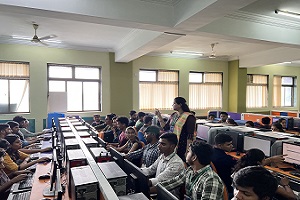Bachelor of Technology in Computer Engineering
| Affiliated to | Duration | Academic Year | Sanctioned Intake | Exam Structure | Theory Exam |
|---|---|---|---|---|---|
| Mumbai University | 4 years, Full Time | 2 semesters each | 180 | Theory, Practical, Oral, Term Work | Conducted by University of Mumbai |

B.Tech in Computer Engineering aims to develop skilled professionals capable of excelling in the fast-advancing technology sector. The program offers a perfect balance of theoretical learning and practical industry exposure. It encourages innovation, analytical thinking, and a problem-solving mindset in students. Core engineering concepts such as programming, data structures, algorithms, computer networks, and operating systems are thoroughly covered. Students also gain expertise in databases, software engineering, and digital systems. Training in emerging technologies like artificial intelligence, machine learning, cloud computing, and blockchain enhances future career readiness. Cybersecurity and data analytics form an essential part of the curriculum to match modern industry demands. Overall, the program equips graduates to become competent technology leaders and innovators in a rapidly transforming digital world.
Vision
To advance computer engineering education and prepare students to be globally competent professionals for the betterment of society.
Mission
To impart strong fundamentals and technical skills for applications in computer engineering through efficient teaching and learning strategies.
To encourage students to become entrepreneurs by fostering their creativity, ethical values, and novelty.
To encourage students to focus on sustainable solutions and enrich research quality through collaboration with academia and industry for societal betterment.
POs, PEOs and PSOs
Program Outcomes (POs)
Engineering Graduates will be able to:
- PO1: Engineering Knowledge: Apply knowledge of mathematics, natural science, computing, engineering fundamentals and an engineering specialization to develop to the solution of complex engineering problems.
- PO2: Problem Analysis: Identify, formulate, review research literature and analyze complex engineering problems reaching substantiated conclusions with consideration for sustainable development.
- PO3: Design/Development of Solutions: Design creative solutions for complex engineering problems and design/develop systems/components/processes to meet identified needs with consideration for the public health and safety, whole-life cost, net zero carbon, culture, society and environment as required.
- PO4: Conduct Investigations of Complex Problems: Conduct investigations of complex engineering problems using research-based knowledge including design of experiments, modelling, analysis & interpretation of data to provide valid conclusions.
- PO5: Engineering Tool Usage: Create, select and apply appropriate techniques, resources and modern engineering & IT tools, including prediction and modelling recognizing their limitations to solve complex engineering problems.
- PO6: The Engineer and The World: Analyze and evaluate societal and environmental aspects while solving complex engineering problems for its impact on sustainability with reference to economy, health, safety, legal framework, culture and environment.
- PO7: Ethics: Apply ethical principles and commit to professional ethics, human values, diversity and inclusion; adhere to national & international laws.
- PO8: Individual and Collaborative Team work: Function effectively as an individual, and as a member or leader in diverse/multi-disciplinary teams.
- PO9: Communication: Communicate effectively and inclusively within the engineering community and society at large, such as being able to comprehend and write effective reports and design documentation, make effective presentations considering cultural, language, and learning differences
- PO10: Project Management and Finance: Apply knowledge and understanding of engineering management principles and economic decision-making and apply these to one’s own work, as a member and leader in a team, and to manage projects and in multidisciplinary environments.
- PO11: Life-Long Learning: Recognize the need for, and have the preparation and ability for i) independent and life-long learning ii) adaptability to new and emerging technologies and iii) critical thinking in the broadest context of technological change.
Program Educational Objectives (PEOs)
- To demonstrate strong foundational knowledge and technical skills in computer engineering, enabling them to solve complex engineering problems and adapt to emerging technologies.
- To impart continuous learning and engage in research activities to stay updated with advancements in both fundamental and cutting-edge areas of computer engineering.
- To have creativity and entrepreneurial spirit to develop innovative and sustainable solutions that address real-world challenges, thereby contributing to economic and social development.
- To practice professionalism, uphold ethical standards, and effectively contribute to multidisciplinary teams and projects in diverse work environments.
- To produce competent professionals who collaborate with industry, academia, and research organizations to address societal and global issues with sustainable and impactful solutions.
Program Specific Outcomes (PSOs)
- To apply foundational knowledge in mathematics, algorithms, and computer science to design, model, and implement efficient computer-based systems that solve real-world industrial problems through innovative and practical solutions.
- To identify user and industry requirements, and use modern tools and technologies to design, develop, and deploy reliable and scalable software systems across various domains.
- To demonstrate entrepreneurial thinking, leadership, and teamwork while upholding strong ethical values to contribute meaningfully to organizations and society.
- To pursue higher education and engage in research to develop environmentally and socially sustainable computing solutions that address current and emerging societal challenges.
Bachelor Engineering in Computer Engineering
| Affiliated to | Duration | Academic Year | Sanctioned Intake | Exam Structure | Theory Exam |
|---|---|---|---|---|---|
| Mumbai University | 4 years, Full Time | 2 semesters each | 180 | Theory, Practical, Oral, Term Work | Conducted by University of Mumbai |
